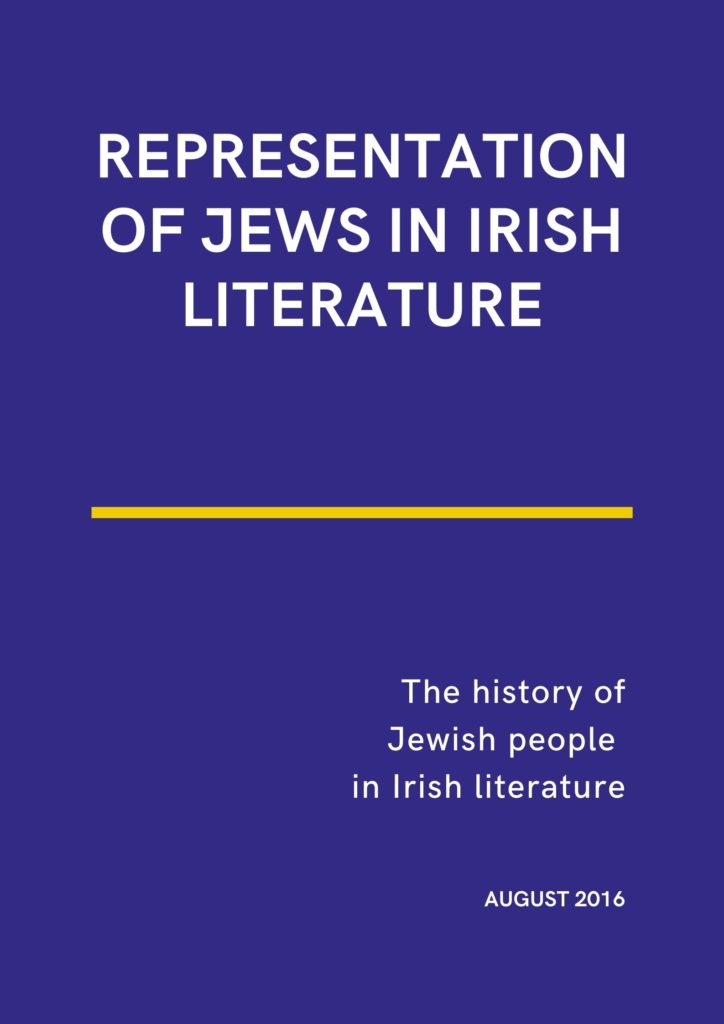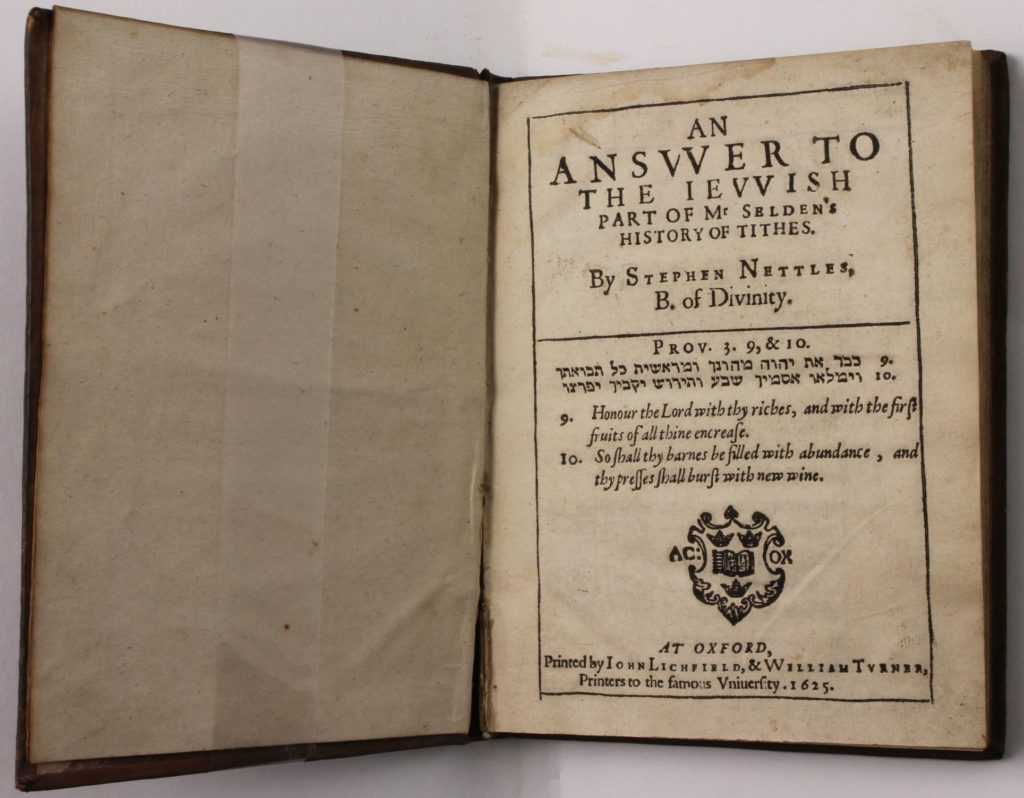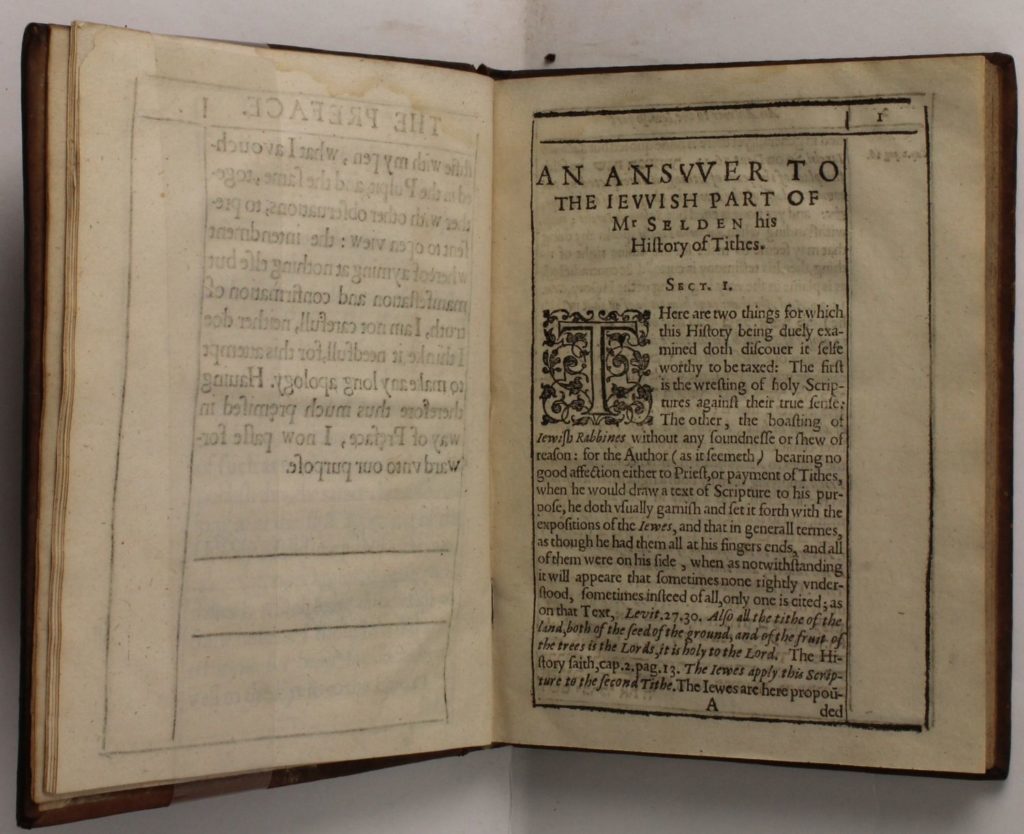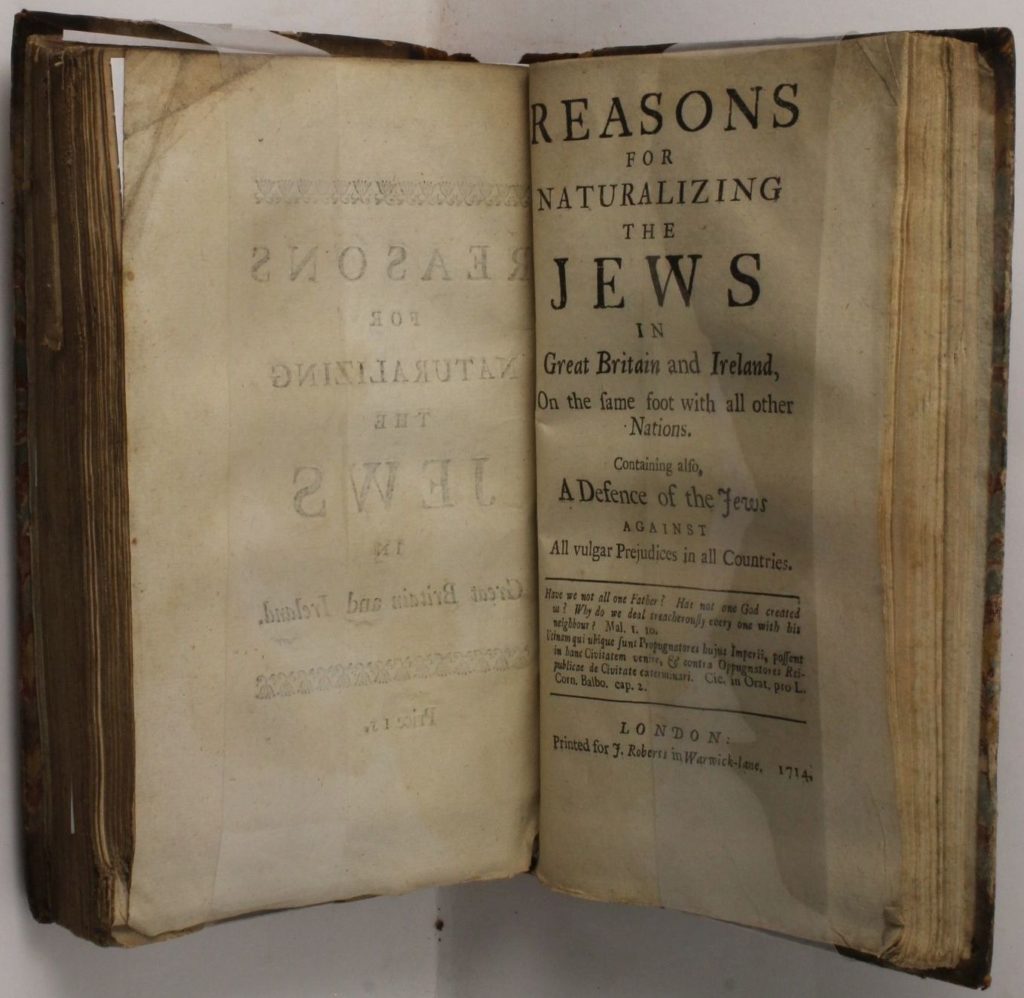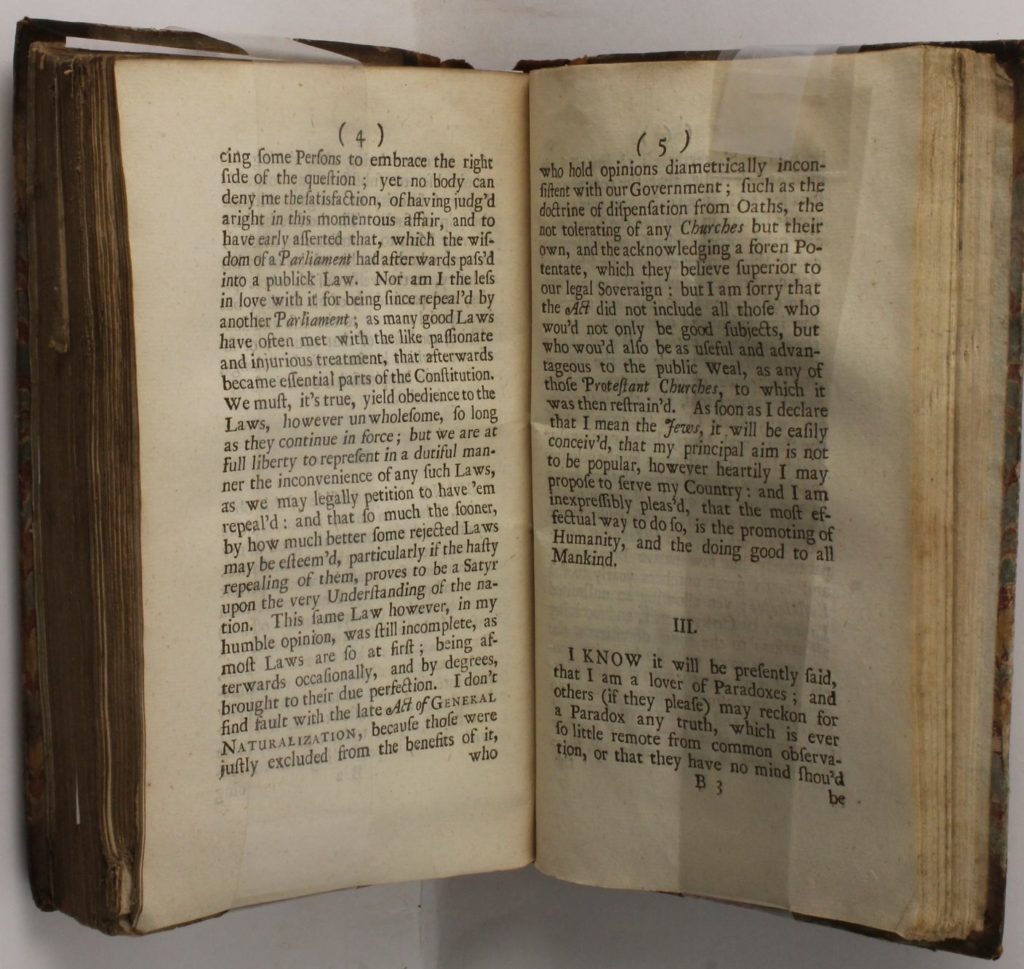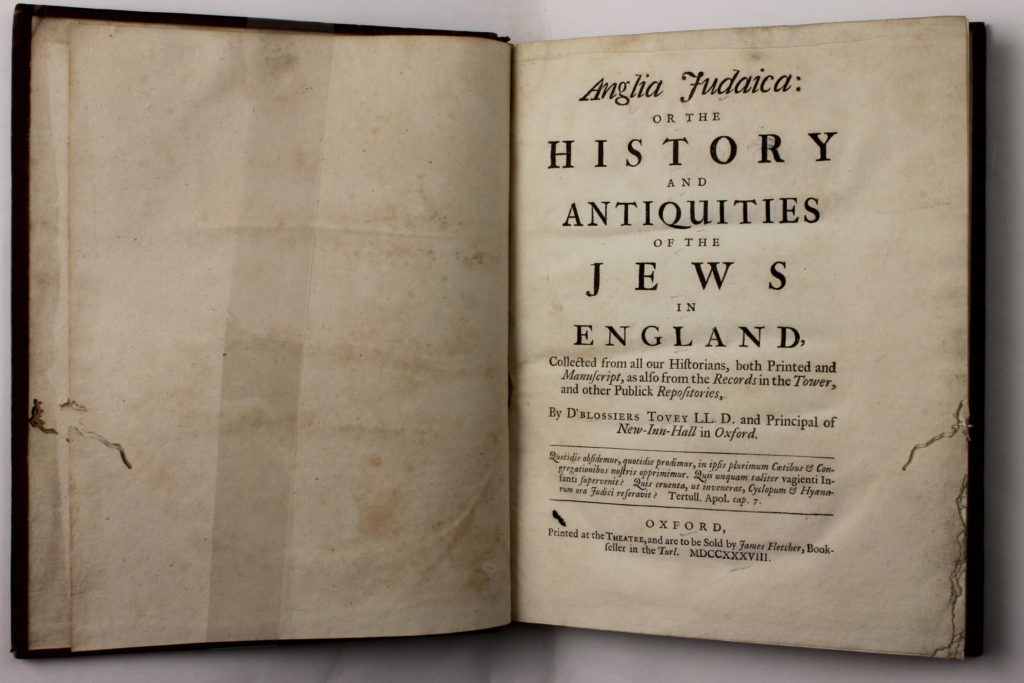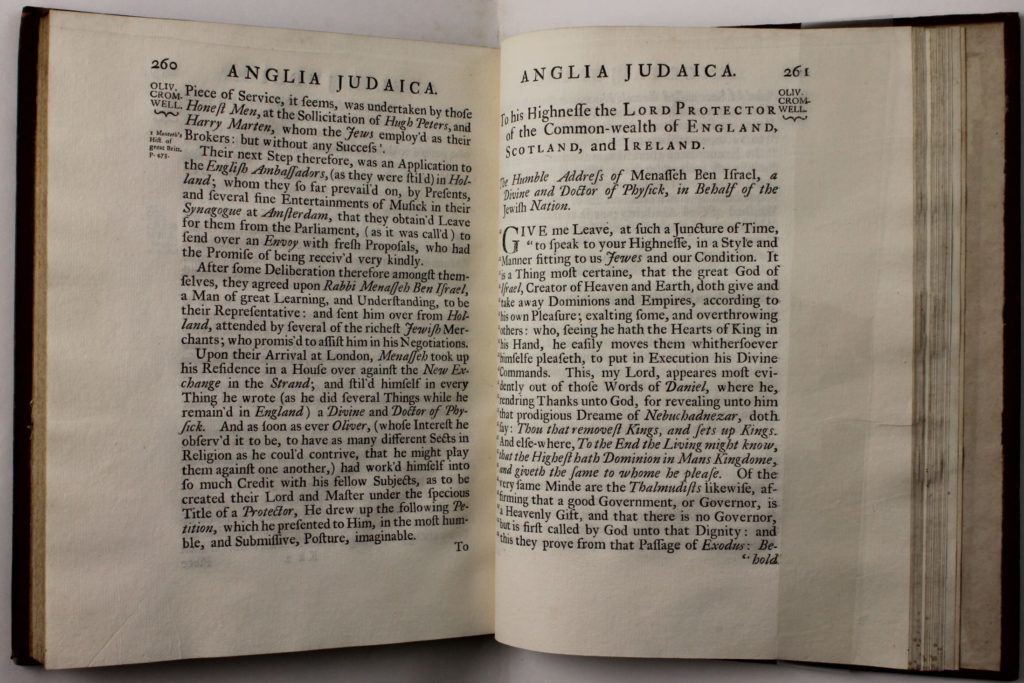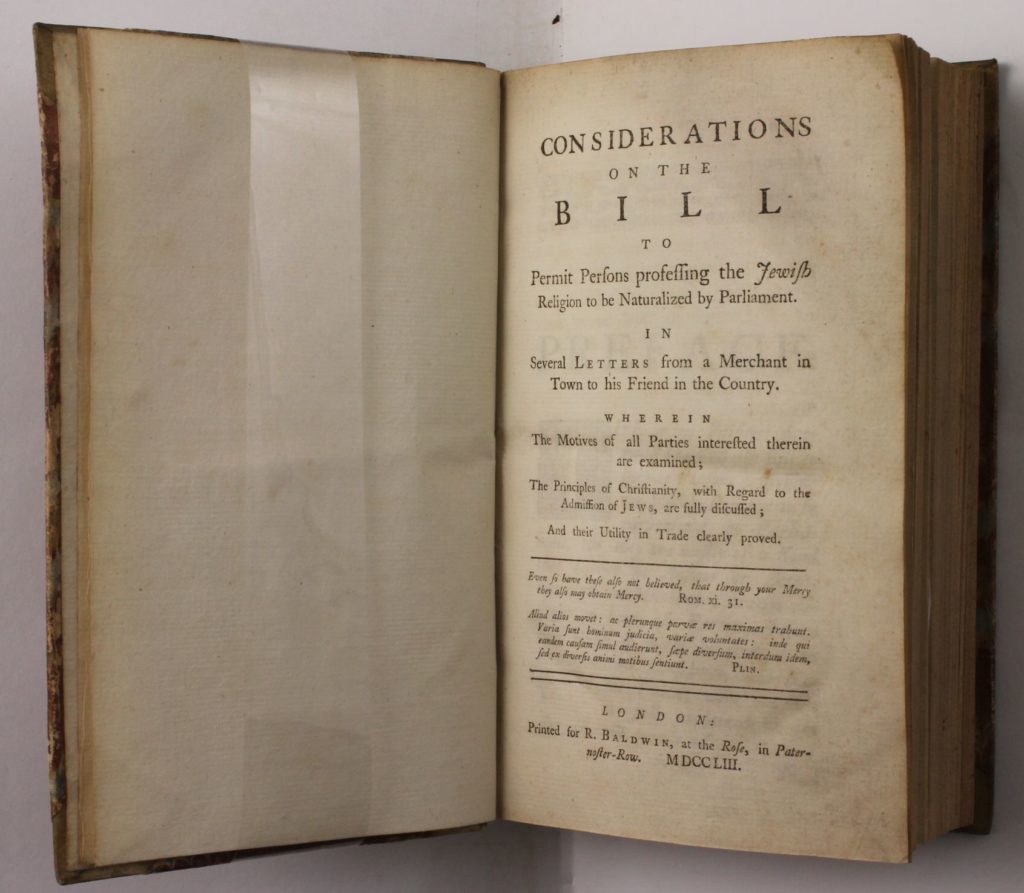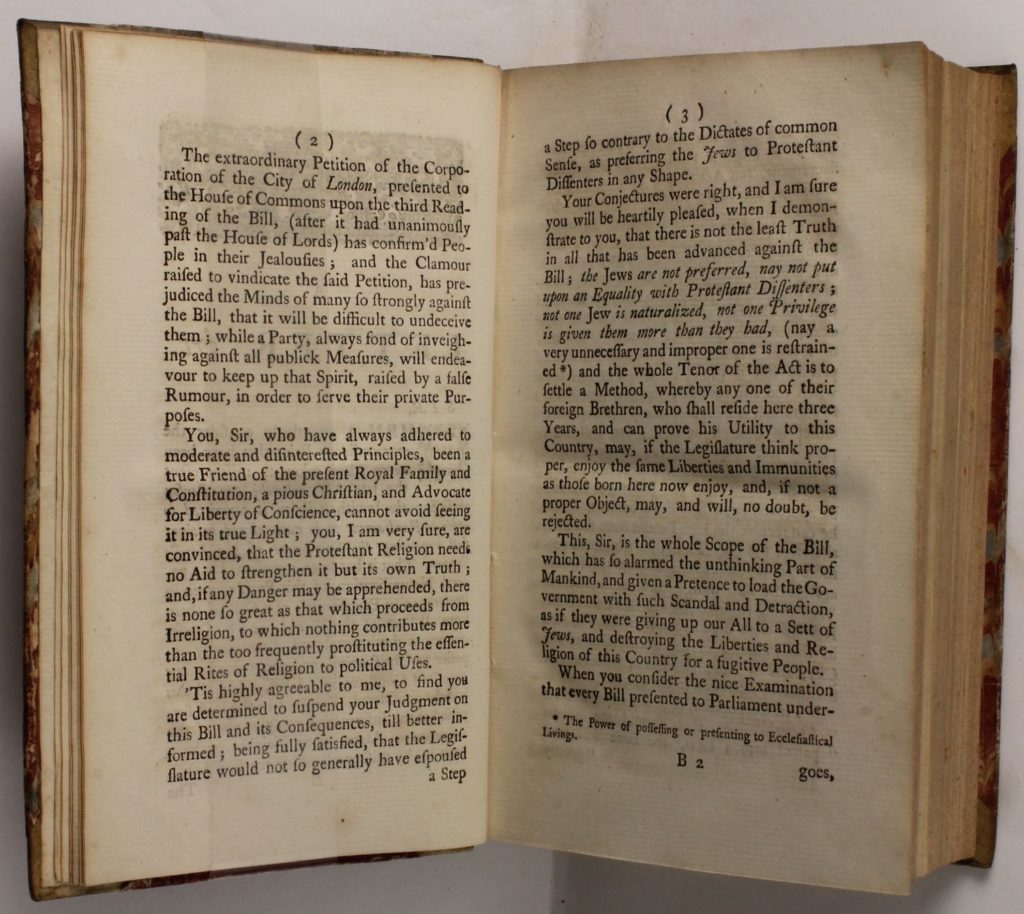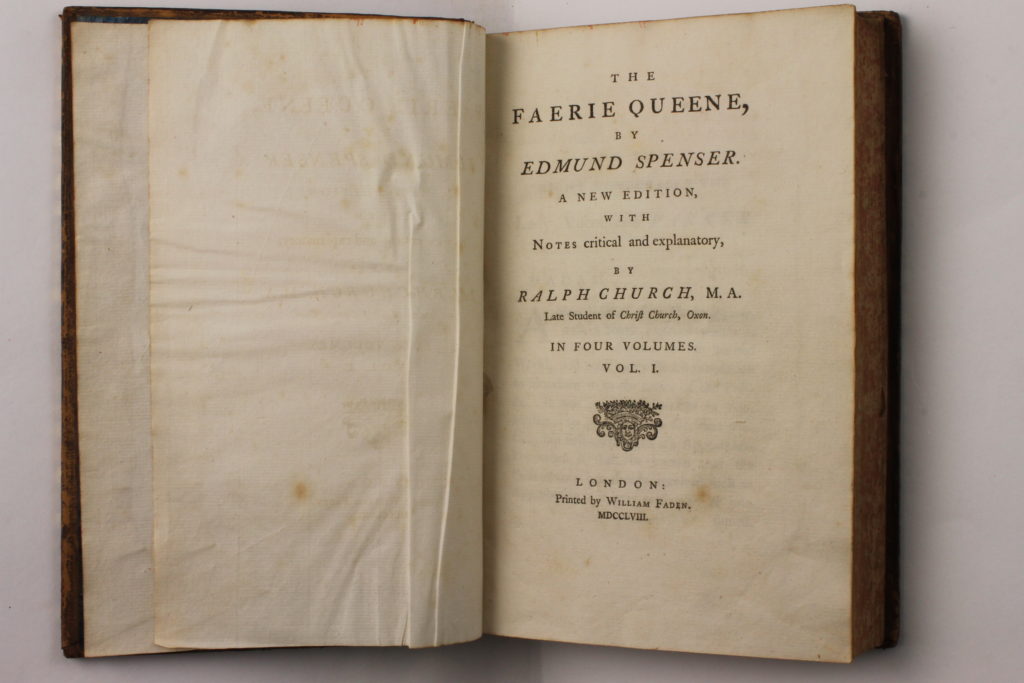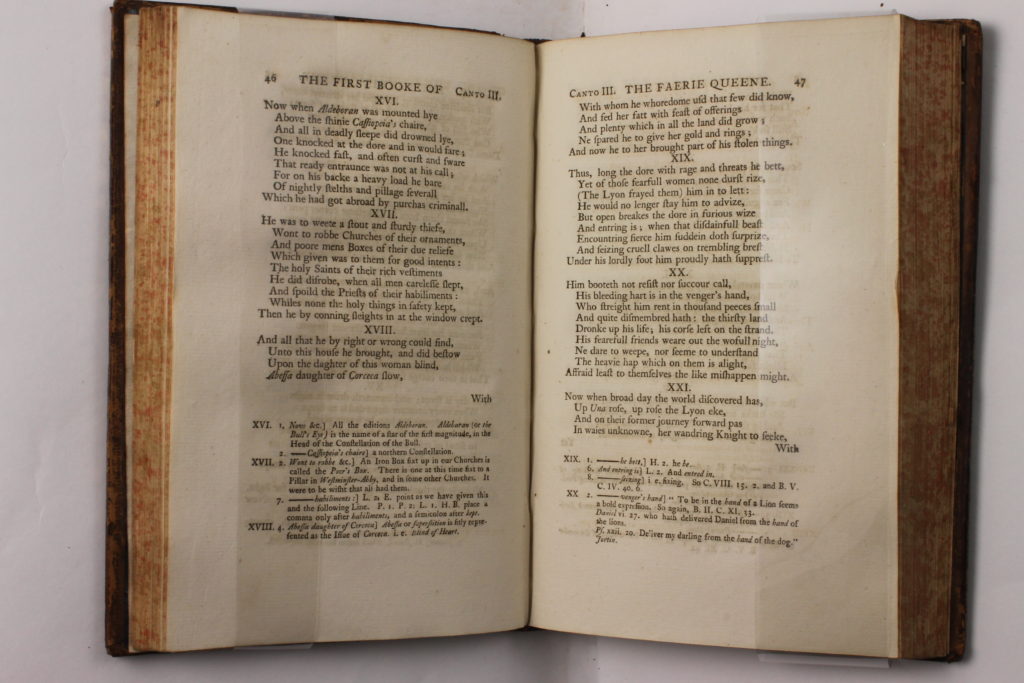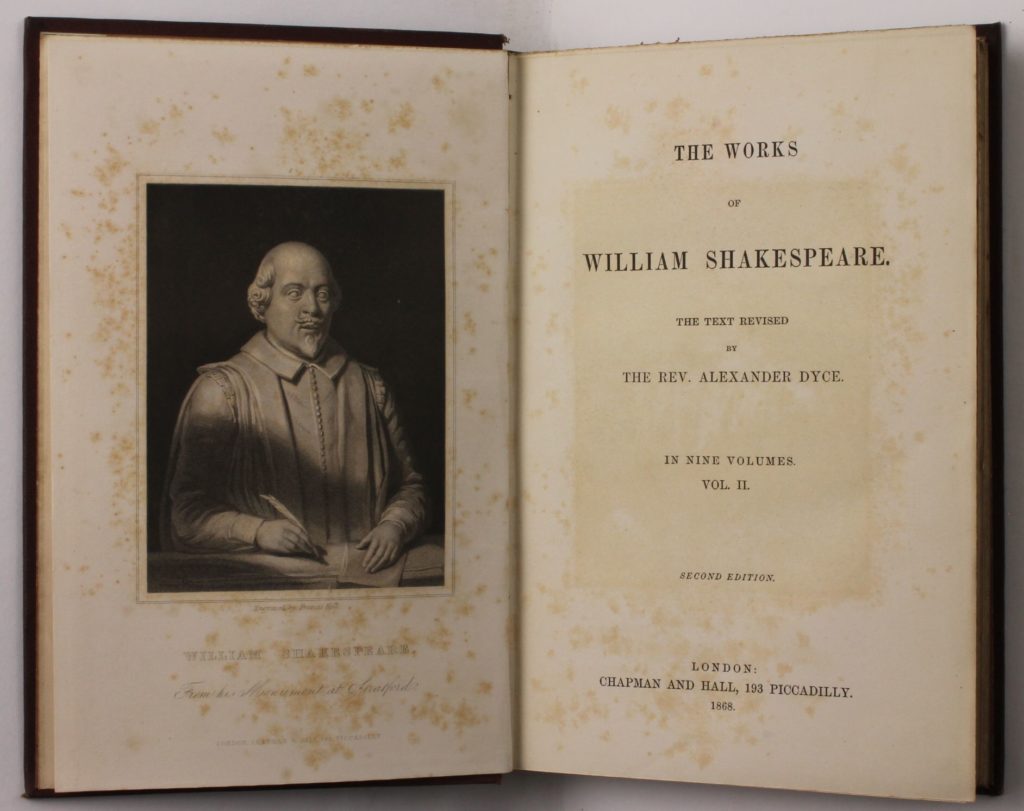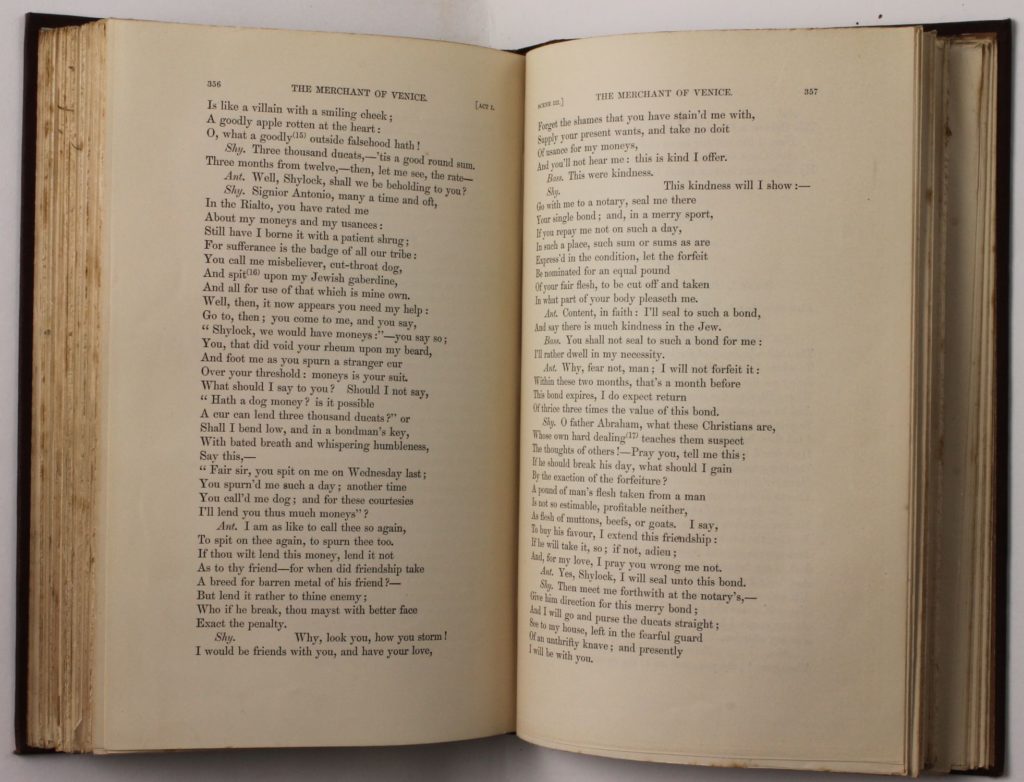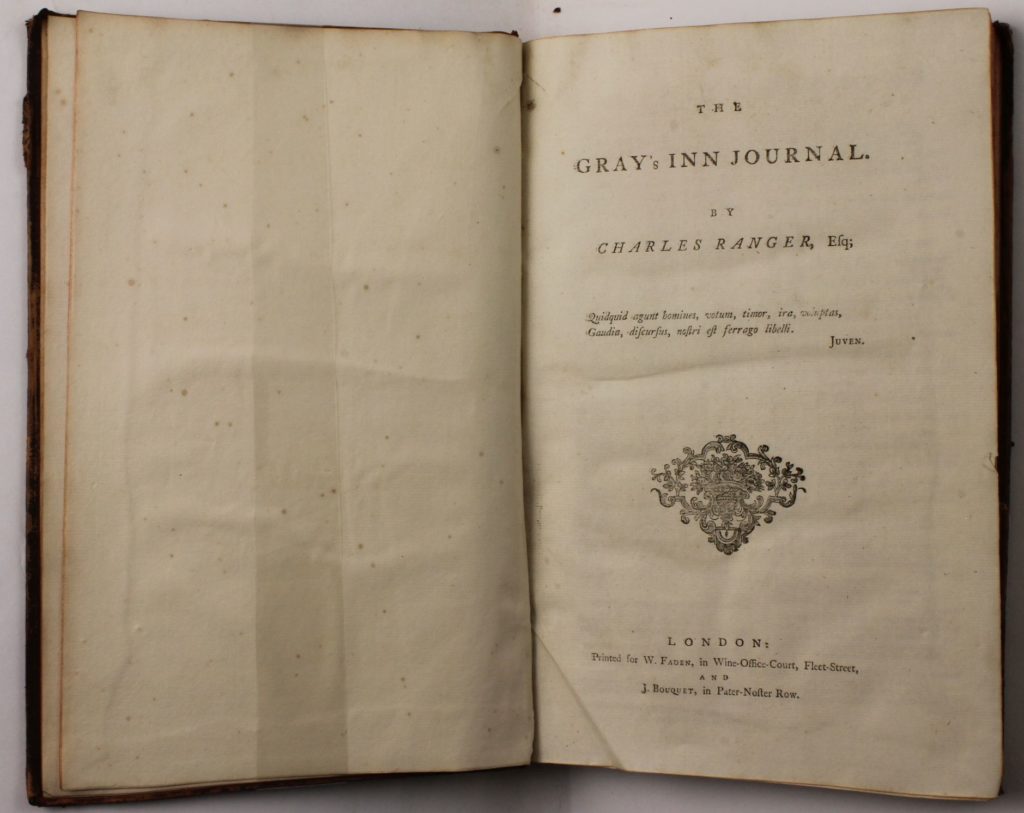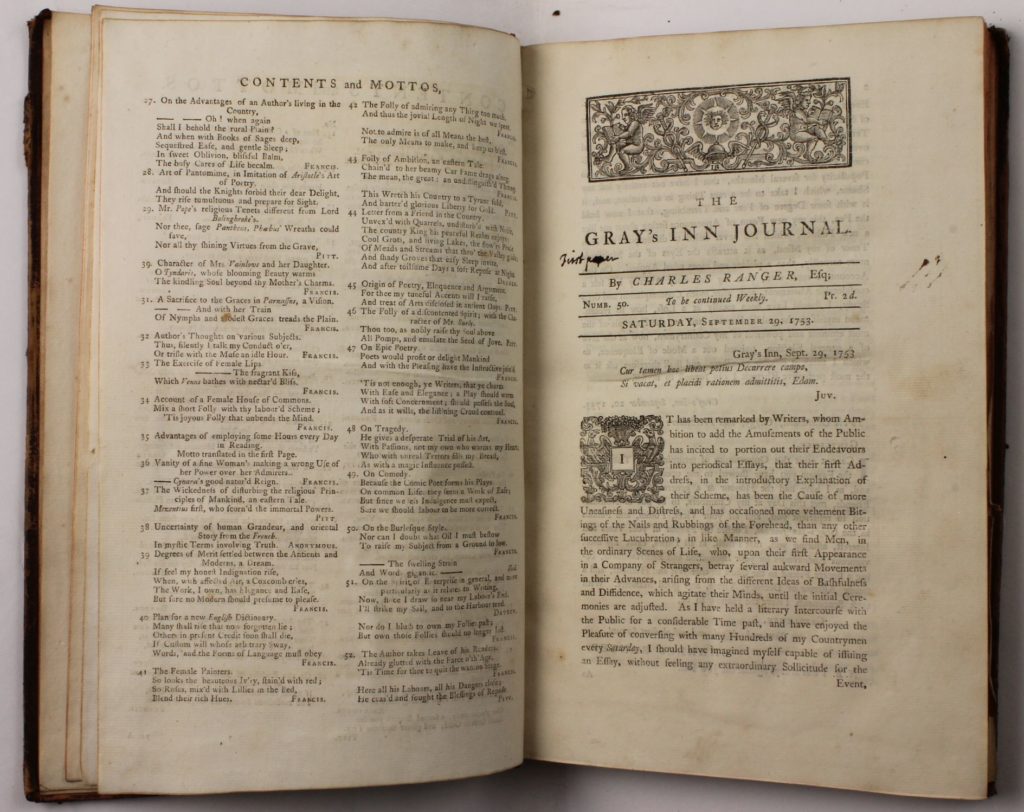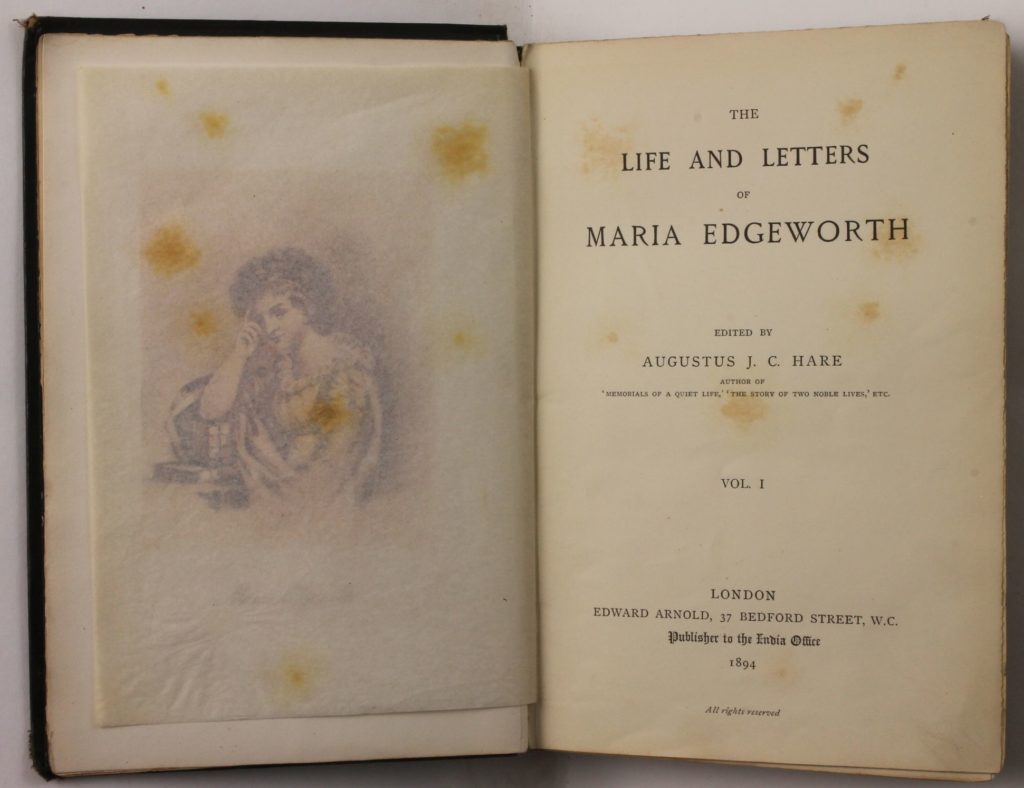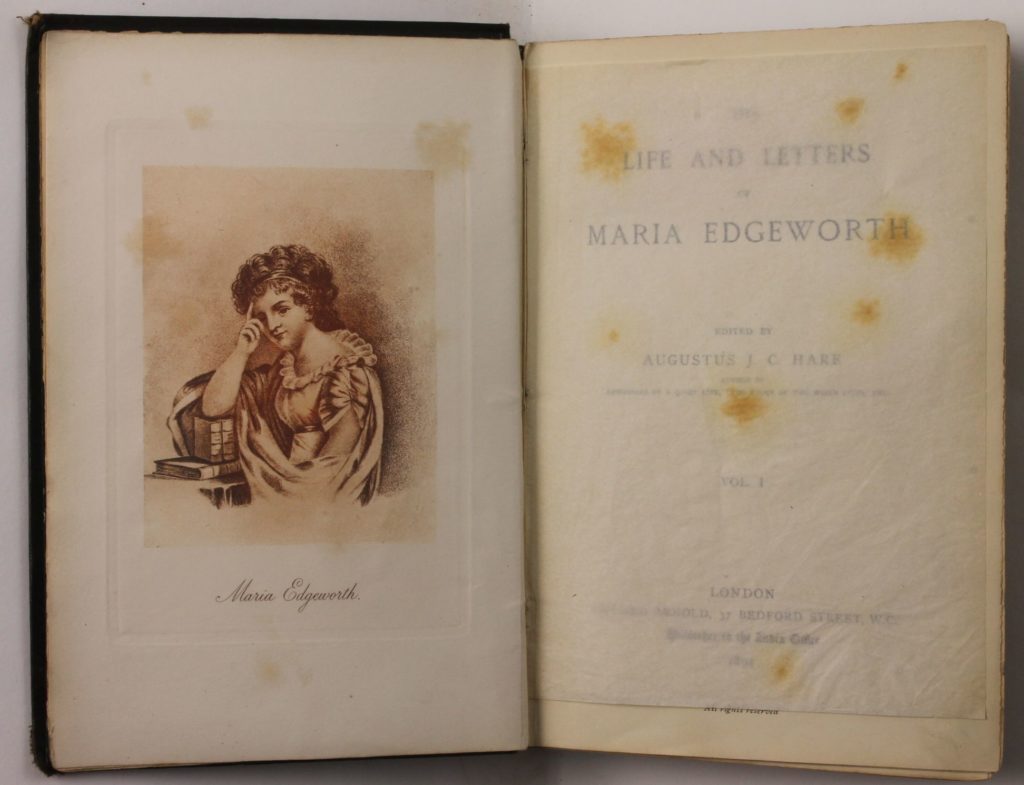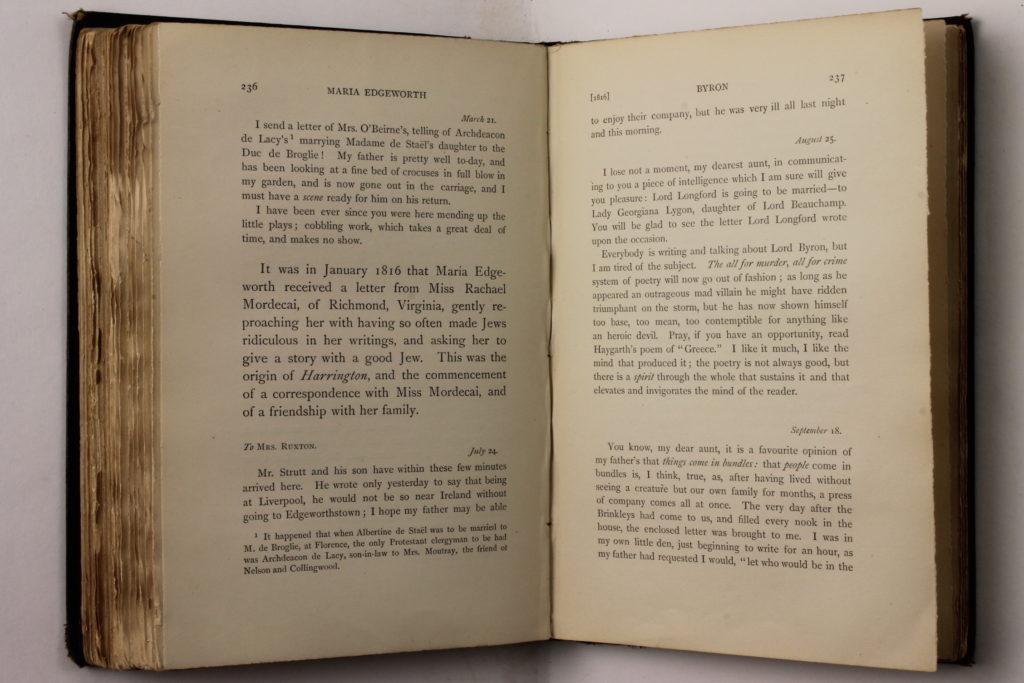This book exhibition on the representation of Jews in Irish literature complemented a 2016 travelling exhibition, which highlighted the history of Jewish people in Ireland and Britain.
The Library holds numerous texts on Jewish history. The items on display show some of the highlights.
The texts range in topic and time from Shakespeare and The Merchant of Venice to the naturalisation of Jews. They reflect the stereotypical attitudes towards Jewish people found in both fiction and non-fiction works during the 17th and 18th centuries.
This exhibition complements the travelling exhibition, which has been funded by the Arts and Humanities Research Council, and organised jointly by Ulster University and NUI Galway, to highlight the history of Jewish people in Ireland and Britain.
An Answer to the Jewish Part of Mr. Selden’s History of Tithes Stephen Nettles 1625 P001336181
Stephen Nettles was an English clergyman and controversialist, who wrote An Answer to the Jewish Part of Mr. Selden’s History of Tithes. In the 1618 work History of Tithes, John Selden argued that tithing (the practice of taking or paying a one-tenth contribution), depended on civil law and not the law of the church.
Selden challenged the authority of the church, and the divine right of the king. It caused concern among English bishops and even led to the intervention of King James I.
Selden was forced to retract his opinions and his work was suppressed.
Stephen Nettles was one of many who wrote negative responses to History of Tithes. His reasons for this were,
Here are two things for which this history being duely examined doth discover it selfe worthy to be taxed: the first is the wresting [distortion of the meaning or interpretation of (something) to suit one’s own interests or views.] of holy scriptures against their true sense: the other, the boasting of jewish rabbines without any soundnesse or shew of reason.
Reasons for naturalizing the Jews in Great Britain and Ireland, on the same foot with all other nations. Containing also, a defence of the Jews against all vulgar prejudices in all countries. John Toland 1714 P001323683
John Toland was a philosopher and free thinker who wrote numerous books and pamphlets on political philosophy and religion. Toland believed in equality, especially for the Jewish community. He was among the first to support full citizenship and equal rights for the Jewish people.
The fact that Toland was discussing this topic as early as 1714 showed the need to address the position of Jewish people in Britain and Ireland.
This came to a head when The Jewish Naturalisation Act of 1753, (the so called ‘Jew Bill’) was passed.
The Bill would guarantee acceptance of the Jewish people by the majority despite their religious and cultural differences. In 1754, however, the Bill was repealed, due to public opposition.
Anglia Judaica, or, the history and antiquities of the Jews in England: collected from all our historians, both printed and manuscript, also from the records D’Blossiers Tovy 1738 P001436631
Tovy was an apothecary in London and had an interest in history. He devoted much of his time to the history of the Jews in medieval England.
Anglia Judaica covers the years 1066 to 1730, from the time of William the Conqueror to George II.
On display is a copy of an address by the Jewish writer and diplomat Ben Israel to Oliver Cromwell on behalf of the Jewish people. Israel fought for the re-admission of the Jews in England. He was granted a pension by Cromwell who was sympathetic to the Jewish cause.
Considerations On The Bill To Permit Persons Professing The Jewish Religion to be Naturalized by Parliament Philo-Patriae 1753 P001420557
The author reacted to the backlash that occurred shortly after the passage of The Naturalisation of the Jews Bill through Parliament. He claimed that the Bill was largely misunderstood and misrepresented, and that he aimed to
[…] remove the groundless fears
surrounding the introduction of the ‘Jew Bill’ in 1753.
His comments included,
[…] the Bill may be useful, and can be no way detrimental to the religion, laws, and trade of this Nation
and,
[…] the whole scope of the bill, which has so alarmed the unthinking part of mankind.
The Faerie Queene. A New Edition, With Notes Critical and Explanatory, By Ralph Church M.A., Late Student of Christ Church Oxon Sir Edmund Spenser 1757 P001107549
The English poet, Sir Edmund Spenser is most famous for the poem, The Faerie Queen, which is one of the longest poems in the English language.
Spenser wrote the poem during the Reformation, using it to highlight the virtues of the Protestant faith against the errors of the Catholic faith.
It is argued that the characters of Abessa, Kirkapine, and Corceca, who represent the Catholic Church in the story, also refer to Judaism by their comparison to Jewish figures in the Bible.
The Satyrs in the poem are depicted as horned and misshapen characters and their description is similar to some stereotypes of Jewish people at this time.
Spenser himself commented that the epic poem is ‘cloudily enwrapped in allegorical devices’.
The Works of William ShakespeareWilliam Shakespeare 1868 P001006718
Shylock, a Venetian Jewish moneylender, is a fictional character in William Shakespeare‘s play The Merchant of Venice.
There are many interpretations of the character of Shylock. On the one hand he is seen as an example of Elizabethan anti-semitism. On the other hand, his characterisation could be seen as Shakespeare’s way of attacking the intolerance to which many Jewish people were subjected to throughout history.
Shylock is made both the villain and the victim of religious prejudice in the play.
SHYLOCK
I hate him for he is a Christian.
You call me misbeliever, cutthroat dog, And spet upon my Jewish gaberdine, […] You called me dog; and for these courtesies I’ll lend you thus much moneys’?
ANTONIO
I am as like to call thee so again
To spit on thee again, to spurn thee too.
The Gray’s Inn Journal Charles Ranger (Arthur Murphy) 1753 P001472271
Arthur Murphy, known under the pseudonym of Charles Ranger, was an Irish writer, barrister, journalist, actor and playwright. Murphy, like many other commentators, was opposed to the introduction of Jewish naturalisation.
This page shows Murphy using the Jewish people to attack political opponents and to make comments on the naturalisation of the Jews. He characterised Prime Minister Henry Pelham, who brought in the Jew Bill in 1753, as Gobbo, Skylock’s servant in The Merchant of Venice. Murphy implied that the Prime Minister was a servant to a Jewish master, or to the Jewish people.
Life and Letters of Maria Edgeworth Maria Edgeworth 1894 P00110941x
Maria Edgeworth was an Anglo-Irish writer of fiction and was a significant figure in the development of the novel in Europe. Although Maria spent most of her childhood in England, her life in Ireland had a large impact on her views and writing.
She often described Jewish characters in a derogatory manner, e.g. in Castle Rackrent, Belinda and the Absentee.
American Jewess Rachel Mordecai sent her a letter, asking her what made her do so. Through their consequent correspondence Edgeworth was encouraged to write Harrington, in which the actions of a reformed ‘anti-Semite’ are narrated. Their families would continue to correspond until 1937.
British Jews, Objects of British Compassion John Thorold 1764 P001447552
This short pamphlet sets out reasons and a plan to convert Jewish people to Christianity. It is a theme which runs through many texts on the history of the Jewish people.
The author’s plan, in five parts is to,
[…] promote spiritual and temporal welfare of our fellow creatures.
It includes steps such as asking authorities of both Christianity and Judaism to list the pros and cons of the other faith. Displayed here is a section this plan.
The text is part of a larger pamphlet by John Thorold, Proposals and their utility, addressed to those who, in their respective stations, are inabled [sic] to patronise them.

